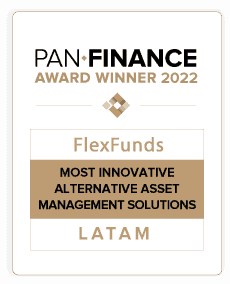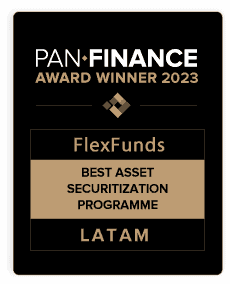- Both mutual funds and hedge funds are financial instruments that pool investors’ assets to seek returns, but they leverage different strategies to achieve this goal.
- Key differences include the degree of regulation, the aggressiveness of strategies, and the liquidity offered in each.
- The securitization of hedge funds, such as that offered by FlexFunds, is emerging as a key strategy. Converting assets into publicly traded securities allows for greater liquidity and facilitates access to international investors.
Among the numerous options in the market, mutual funds and hedge funds are some of the most established financial instruments and play a crucial role in the portfolios of asset managers, who choose between these instruments based on investors’ goals and risk tolerance.
Regulation, limitations, strategies for returns, liquidity, and other characteristics are vital in evaluating the structure of mutual funds and hedge funds, two of the most popular financial instruments in asset managers’ portfolios globally.
In both instruments, the common challenge is to achieve effective management and distribution of investments to meet their objectives, according to FlexFunds, a leading provider for asset managers in designing and issuing investment vehicles (ETPs).
Currently, asset managers face a highly competitive environment where portfolio diversification is essential for investors to navigate turbulent economic times amid global shocks from high inflation and elevated interest rates, according to FlexFunds.
In this context, FlexFunds finds it very important to simplify the distribution and access to international private banking more effectively to enhance the reach of instruments such as hedge funds. FlexFunds’ solutions are facilitating the cost-efficient securitization of existing hedge funds, enabling greater liquidity and easier access to international investors.
Their FlexFeeder solution allows asset managers to securitize private shares of a fund to improve global distribution through a “Euroclearable” listed security.
What do Mutual Funds and Hedge Funds Have in Common?
Regarding commonalities, mutual funds and hedge funds are pooled investment vehicles, grouping various investors’ assets to seek returns.
Both instruments rely on asset managers – administrators who apply various strategies available in each of these vehicles to meet investment goals. Professional management, involving strategic decision making by financial experts about investors’ portfolios, is subject to management fees and instrument performance fees, among others.
Mutual funds and hedge funds are prominent financial instruments, with asset managers choosing them based on investors’ goals and risk tolerance.
How Do Both Instruments Differ?
Despite their shared characteristics, mutual funds and hedge funds differ significantly in their management, structure, and the type of regulation governing each, especially after the 2008 financial crisis that caused a shake-up in the global financial sector.
Hedge funds employ a more aggressive management style to try to achieve the highest possible returns regardless of market conditions, whether bullish or bearish. They are characterized by monitoring potential imbalances in assets to take positions in them (both short and long sales).
One of the main features of hedge funds is their ability to generate returns from borrowed assets, which are sold with the expectation that their price will fall in the future and then repurchased at a lower cost. The difference between the selling and repurchasing prices constitutes a short position within hedge funds.
On the other hand, a long position within hedge funds involves acquiring an asset whose price is considered undervalued to generate returns from its future sale when its value stabilizes. To execute these positions, hedge funds often resort to financial leverage, which in excess could pose risks, according to various financial analysts.
Mutual funds attract a broader audience, facilitating access through digitization and allowing smaller investments. In comparison, hedge funds target institutional investors with larger capital.
After creating a hedge fund, securitization can be considered to increase its distribution—a process involving converting liquid or illiquid assets into an exchange-traded product (ETP), according to FlexFunds. Through this company’s FlexFeeder product, it is possible to securitize an existing hedge fund to expand the base of international investors who can subscribe to the fund.
On the other side, mutual funds not only have stricter regulations but also have a longer-term investment horizon. Additionally, by adopting more conservative strategies, they seek to minimize the level of risk, although they may generally offer lower returns compared to hedge funds, which operate with fewer limitations. In the U.S., the operation of mutual funds is regulated under the Securities Act of 1933 and the Investment Company Act of 1940, overseen by the Securities and Exchange Commission (SEC).
Mutual Funds vs. Hedge Funds: What is the Scope of These Instruments?
Mutual funds are geared toward a much broader audience, as significant investments are not required to participate, and they are easily accessible through digitization.
The withdrawal conditions of capital largely depend on the type of fund chosen, whether it is fixed income (such as certificates of deposit and bonds, among others), equity (stocks), or mixed income (a combination of both). Mutual funds are also open to daily trading, allowing investors to buy or sell their shares.
In general, hedge funds are aimed at specialized and institutional investors with more capital. Due to their structure, they are subject to so-called lock-up periods and may require notification periods before funds can be withdrawn, generally resulting in greater liquidity restrictions.
The size of these instruments is reflected in the amount of assets under management in each. In the investment fund group, it is estimated that these assets reached $61 trillion globally, with $31.8 trillion accounted for in the Americas alone, according to Statista1.
On the hedge fund industry side, Statista figures show that the value of assets under management has experienced a rebound in the last decade after the financial crisis and reached $5 trillion2 by 2023.
Choosing one instrument over the other will largely depend on the investment horizon outlined by asset managers and investors, as well as the risk profile of the latter and the capital available for this purpose. In this context, FlexFunds positions itself as a key facilitator in the asset management industry by offering securitization options for hedge funds. FlexFunds seeks to simplify the distribution and access to international private banking efficiently. The securitization of hedge funds, such as that provided by FlexFunds, emerges as an important strategy to increase liquidity and facilitate access to international investors.
Sources:
- https://www.statista.com/statistics/273704/managed-assets-in-investment-funds-worldwide/#:~:text=As%20of%202022%2C%20the%20managed,trillion%20U.S.%20dollars%20that%20year.
- https://www.statista.com/statistics/271771/assets-of-the-hedge-funds-worldwide/#:~:text=In%202023%2C%20the%20value%20of,managers%20in%20the%20United%20States.







